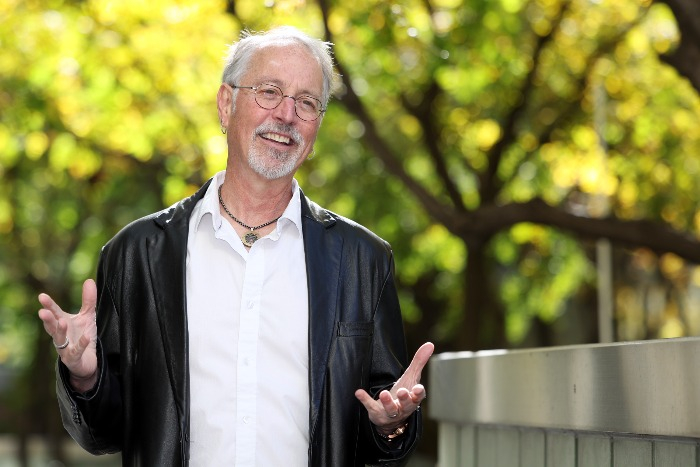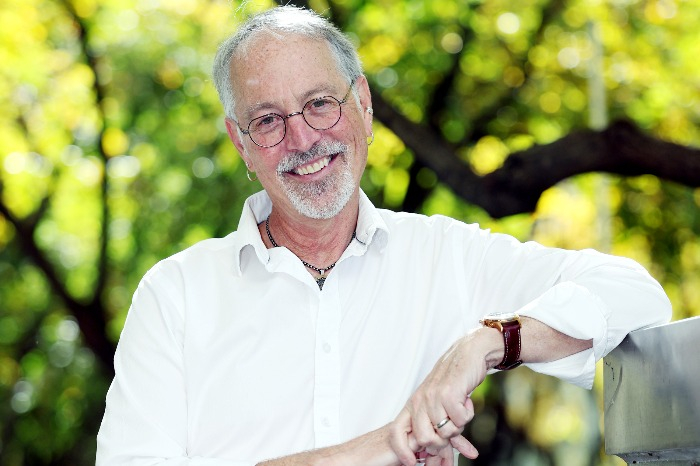Korea must embrace diversity to sustain K-culture: Sam Richards
The country must encourage ideas from outside the center to continue its dynamic changes, the Penn State University professor says
By Oct 25, 2022 (Gmt+09:00)
LG Chem to sell water filter business to Glenwood PE for $692 million


Kyobo Life poised to buy Japan’s SBI Group-owned savings bank


KT&G eyes overseas M&A after rejecting activist fund's offer


StockX in merger talks with Naver’s online reseller Kream


Mirae Asset to be named Korea Post’s core real estate fund operator



When Penn State University sociology professor Sam Richards introduced Korean pop culture into his lectures three years ago, he compared its power to a sudden strong wave in the ocean.
"You are getting out of the water and standing on the edge. You turn your back on the ocean and the waves just come crashing over you, knock you over and throw you up on the shore," explaining how Korean cultural products have come to take over the world.
Richards teaches the largest race, gender and cultural relations university course in the US with more than 760 students each semester and a 25-year legacy. The course was the subject of an Emmy Award-winning TV broadcast in 2018, "You Can't Say That."
He is visiting Seoul this week to give lectures on his views of Korean society, culture and the role of its highly educated young people to address global issues such as climate change. He will also deliver a speech on Korean culture and human resources during Global HR Forum hosted by The Korea Economic Daily on Nov. 2-3.
The following is a transcript of his recent interview with The Korea Economic Daily.
▲ You have been paying attention to Korean society and culture and have incorporated Korea’s global influence into your lectures. What fascinates you about Korea?
“I think everything that Korea makes is very unique. Korea maintains its own characteristics in all cultural genres like pop music, drama series and movies. Korea is very good at taking centuries of traditions and producing modern culture in its unique way – it is not trying to be Western, Chinese or Japanese but to be 'Korean.'
It has a very important soft power that the world is paying attention to, and I am attracted to the related phenomena as a sociologist. I also play music as a drummer and listen to a lot of work of K-pop artists, such as BTS and Blackpink – they are very cool.”
▲ Is it in recent years that you have become interested in Korea?
"It goes back to the early 1980s when I became interested in Korea for the first time. I was studying in Latin America and was aware of the military dictatorships in the region at the time and in 1984, I made a graduate student friend from Korea and learned about its dictatorship and democracy movement at the time.
Since then, I have always paid attention to Korea as my research was on economic and political development. It was one of the world’s poorest countries in the 1950s, but it rose to host the Olympics in 1988, and then the economy started to explode onto the global stage. It started to amaze the world with cars, semiconductors, electronics of high quality, then most importantly, pop culture in the early 2000s.
I think what was unique for Korea was that the economic and cultural penetration happened at the same time. We learn about countries primarily through their economic penetration, but Korea emerged onto the global stage in a different way from other nations."
▲ You have mentioned BTS many times in your lectures as an example of K-pop's impact on the world. Why do you think the boy band is iconic in terms of K-pop?
“What is so curious about BTS is they probably perfectly represent Korea's positioning in the global system.
BTS is by far more popular than any other K-pop group and while they are truly talented and exceptional at what they do, they are not twenty or thirty times 'more talented and exceptional' than any other band. They just have some sort of magic formula and it is difficult for someone like me to assess what that is or where it comes from.
This is similar to the magic formula that gives Korea both its hard and soft power and allows this country to stand out around the world in a unique and exceptional way.”

▲ Some critics say that Korean society lacks diversity and doesn’t fully embrace differences in terms of race, gender, class and others. Do you think this could affect K-culture's power in the future?
“Of course. I know that many Korean parents want their children to go to prestigious universities, work for conglomerates and live successful lives. Like them, people in the center of society want to remain as part of the center and they reproduce it. But cogs in the wheel are also very important – people on the margins or outside the center have less to lose and they can be more creative by seeing different possibilities and making dynamic changes. This is no exception for Korea.”
“I agree that Korea’s hyper cram school system is the cause of the depression that many Korean young people experience. Many kids in Korea start to learn English when they are two to three years old and believe that the university they attend is the most powerful factor to decide their lives. They feel they are never good enough no matter how hard they study.
But I see a lot of Korean students that are very smart – I gave a special lecture to some Korean high school students in May and they asked me some amazing questions. They were two or three times as smart as US students. Korea is one of the most highly educated countries, which can lead the world to address critical issues such as climate change.”
▲ Korea has also experienced a lot of conflict that seems to impede its progress to becoming a healthier society. What are your thoughts on this?
“I know there are many conflicts associated with the growth of chaebol (large family-owned conglomerates) and labor unions, as well as issues surrounding politics, generations and gender. But I think a certain amount of conflict is inevitable, especially in countries that have experienced a lot of innovation such as Korea, and there are some good sides as dynamic growth comes out of conflict. For example, Seoul is an amazing city that has expanded over the past 60 years – such development would have been impossible without positive ideas arising out of conflict.”
Write to Jihyun Kim and Hye-in Lee at snowy@hankyung.com
Jennifer Nicholson-Breen edited this article.
-
 EntertainmentCJ ENM’s TVing looks beyond Korea with Yonder, other K-drama series
EntertainmentCJ ENM’s TVing looks beyond Korea with Yonder, other K-drama seriesOct 21, 2022 (Gmt+09:00)
3 Min read -

-
 Corporate governanceK-pop giant SM up against Align Partner's shareholder activism
Corporate governanceK-pop giant SM up against Align Partner's shareholder activismOct 04, 2022 (Gmt+09:00)
2 Min read -
 The KED ViewSpringtime hopeful for K-Culture’s continued Belle Époque
The KED ViewSpringtime hopeful for K-Culture’s continued Belle ÉpoqueMar 17, 2022 (Gmt+09:00)
4 Min read -
 EntertainmentBTS, TWICE to lead restart of K-pop global live concerts
EntertainmentBTS, TWICE to lead restart of K-pop global live concertsNov 17, 2021 (Gmt+09:00)
2 Min read


